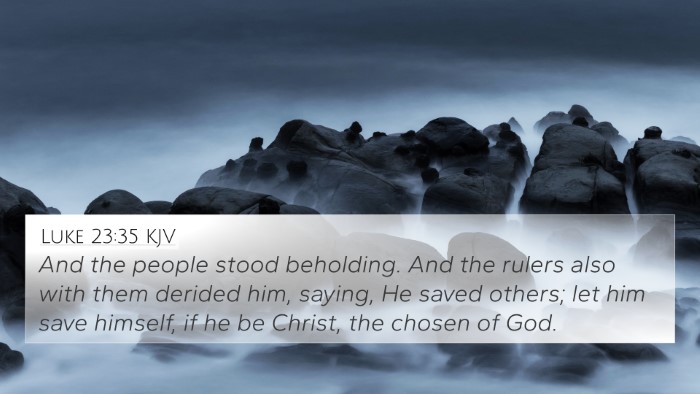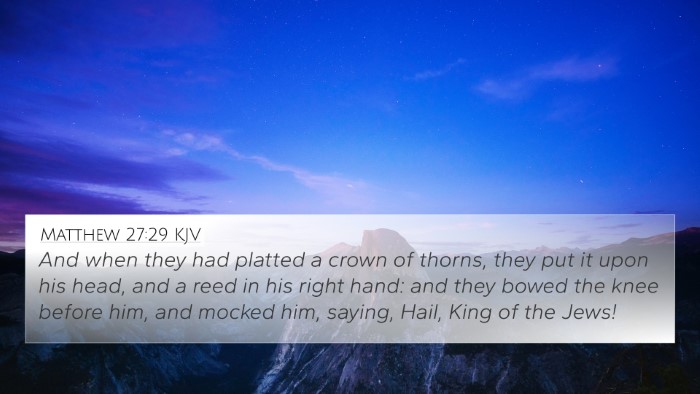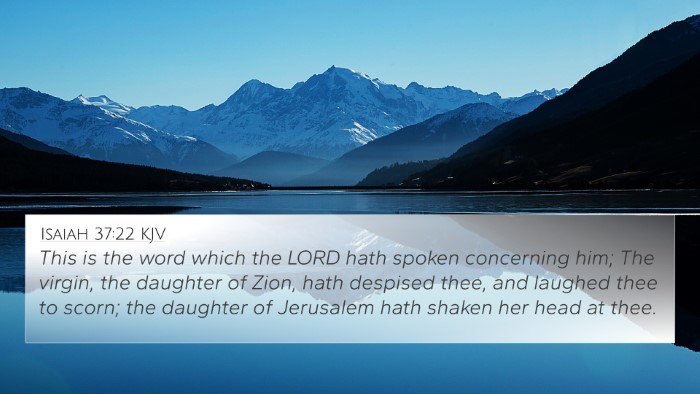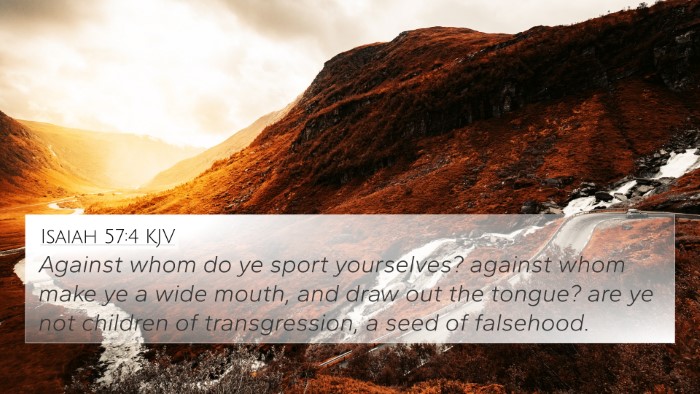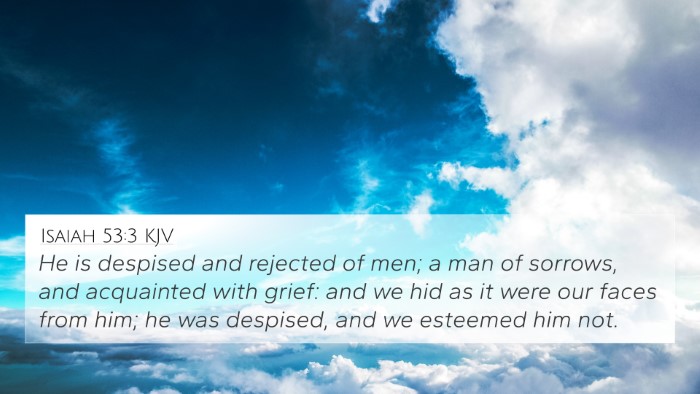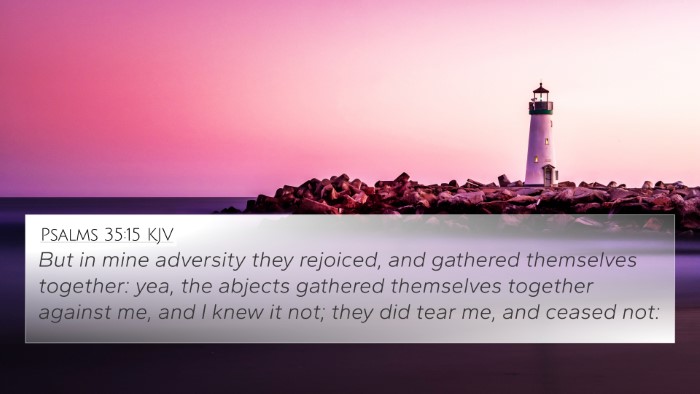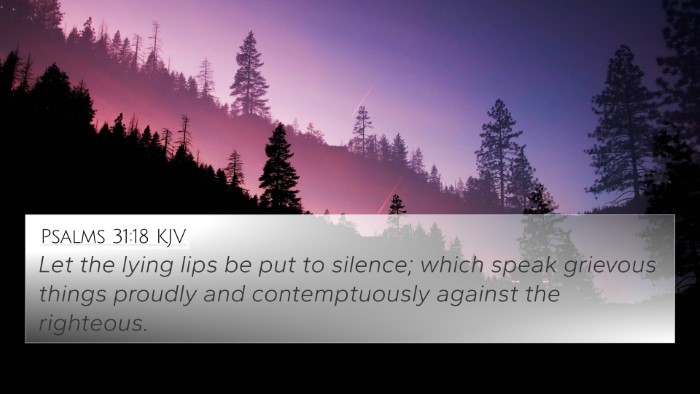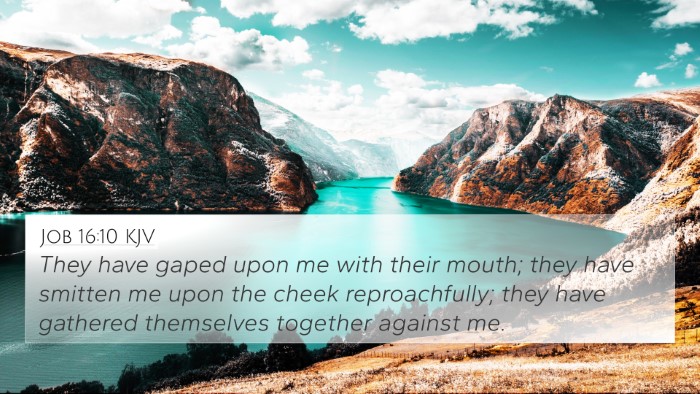Psalms 22:7 - Meaning and Interpretation
Psalms 22:7 states, "All they that see me laugh me to scorn: they shoot out the lip, they shake the head, saying," which reflects significant moments of suffering and mockery. This verse is nestled in a psalm often associated with deep lament and has been linked to the experiences of Jesus on the cross. Below, we will explore various commentaries, revealing insights from biblical scholars Matthew Henry, Albert Barnes, and Adam Clarke.
Summary of Insights
This verse encapsulates the sorrow and derision faced by the speaker, mirroring the experiences of Christ. The scorn from onlookers is indicative of the greater suffering endured, which connects deeply within the text.
1. Matthew Henry's Commentary
Matthew Henry emphasizes the depth of humiliation and the psychological torment the speaker endures. He observes that the onlookers’ mockery is not merely an expression of disdain but also reflects a misunderstanding of divine purpose. The laughter of those who observe reflects a spiritual blindness, as they fail to see the significance of the events unfolding.
2. Albert Barnes' Commentary
Albert Barnes points out that this verse illustrates a feeling of abandonment in times of distress. He correlates the scornful remarks made by the spectators to the prophetic nature of the Scriptures. Barnes suggests that such mockery was fulfilled in the life of Christ during His crucifixion, where onlookers jeered, fulfilling the words of the psalmist, indicating a profound connection between the Old and New Testaments.
3. Adam Clarke's Commentary
Adam Clarke delves deeper into the cultural context of this verse, explaining that mocking was a common response to the sufferer in ancient Near Eastern societies. He notes that this act of scorn serves a dual purpose: it both underscores the suffering of the individual and fulfills prophecy regarding the Messiah's suffering. Clarke highlights the importance of understanding the human condition in relation to the divine narrative.
Bible Verse Cross-References
- Matthew 27:39-40: "And they that passed by reviled him, wagging their heads, and saying, Thou that destroyest the temple, and buildest it in three days, save thyself." - A clear parallel to the mockery described in Psalm 22:7.
- Mark 15:29-30: "And they that passed by railed on him, wagging their heads, and saying, Ah, thou that destroyest the temple, and buildest it in three days, save thyself..." - Another account of ridicule directed toward Jesus.
- Luke 23:35: "And the people stood beholding. And the rulers also with them derided him, saying, He saved others; let him save himself..." - This verse again highlights the mockery faced during the crucifixion.
- John 19:24: "They said therefore among themselves, Let us not rend it, but cast lots for it, whose it shall be: that the scripture might be fulfilled, which saith, They parted my raiment among them, and for my vesture they did cast lots." - Illustrates a fulfillment of prophecy amidst mockery.
- Psalm 69:9: "For the zeal of thine house hath eaten me up; and the reproaches of them that reproached thee are fallen upon me." - This psalm resonates with the overarching theme of scorn and suffering.
- Isaiah 53:3: "He is despised and rejected of men; a man of sorrows, and acquainted with grief..." - Connecting the suffering servant motif and mockery.
- Job 30:1: "But now they that are younger than I have me in derision, whose fathers I would have disdained to have set with the dogs of my flock." - Indicates the ancient context of mockery faced by the suffering individual.
- Proverbs 14:9: "Fools make a mock at sin: but among the righteous there is favor." - Illustrates the folly of mockery in the face of spiritual truths.
- Luke 6:22: "Blessed are ye, when men shall hate you, and when they shall separate you from their company, and shall reproach you, and cast out your name as evil, for the Son of man's sake." - Reflects the idea of suffering persecution.
Thematic Connections
The connections between Psalms 22:7 and various New Testament passages underline a thematic concern regarding suffering, mockery, and divine purpose. The shared experiences of scorn faced by both the psalmist and Christ serve to remind readers of the continuity in Scripture.
Cross-referencing Themes
The connections between the psalms and the life of Jesus provide a rich area for Bible verse parallels, demonstrating a deeper understanding of the scriptures as an inter-Biblical dialogue. These references accentuate the importance of cross-referencing Biblical texts to grasp the intricacies of the faith.
Tools for Bible Cross-Referencing
When studying these connections, utilize Bible concordance, Bible cross-reference guides, and various Bible reference resources to enhance your understanding. Researching through these tools can illuminate the links between verses effectively.
Practical Application
For those preparing sermons or seeking deeper insights into their faith, understanding cross-references like the ones provided for Psalms 22:7 allows for a richer interpretive experience, enhancing personal study and communal teaching.
Conclusion
Psalms 22:7 is not merely a verse of lament but a profound reflection on the nature of scorn faced by the believer, a theme masterfully interwoven throughout the scriptures. By employing a cross-reference approach, one can uncover layers of meaning that reveal the heart of God's faithfulness amidst human derision.












